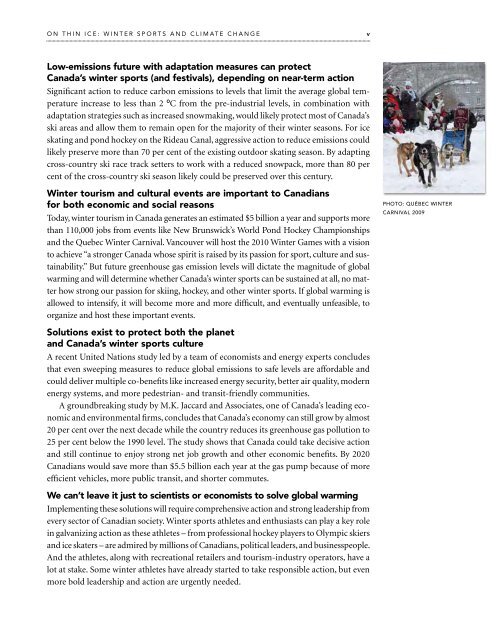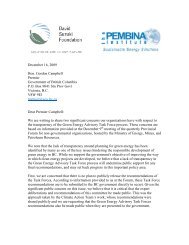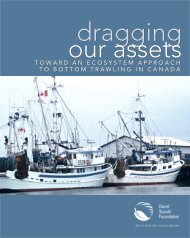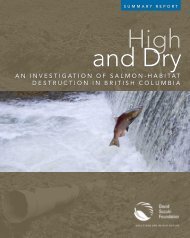On Thin Ice: Winter Sports and Climate Change - David Suzuki ...
On Thin Ice: Winter Sports and Climate Change - David Suzuki ...
On Thin Ice: Winter Sports and Climate Change - David Suzuki ...
Create successful ePaper yourself
Turn your PDF publications into a flip-book with our unique Google optimized e-Paper software.
on thin ice: winter sports <strong>and</strong> cliMate change<br />
Low-emissions future with adaptation measures can protect<br />
Canada’s winter sports (<strong>and</strong> festivals), depending on near-term action<br />
Significant action to reduce carbon emissions to levels that limit the average global temperature<br />
increase to less than 2 ºC from the pre-industrial levels, in combination with<br />
adaptation strategies such as increased snowmaking, would likely protect most of Canada’s<br />
ski areas <strong>and</strong> allow them to remain open for the majority of their winter seasons. For ice<br />
skating <strong>and</strong> pond hockey on the Rideau Canal, aggressive action to reduce emissions could<br />
likely preserve more than 70 per cent of the existing outdoor skating season. By adapting<br />
cross-country ski race track setters to work with a reduced snowpack, more than 80 per<br />
cent of the cross-country ski season likely could be preserved over this century.<br />
<strong>Winter</strong> tourism <strong>and</strong> cultural events are important to Canadians<br />
for both economic <strong>and</strong> social reasons<br />
Today, winter tourism in Canada generates an estimated $5 billion a year <strong>and</strong> supports more<br />
than 110,000 jobs from events like New Brunswick’s World Pond Hockey Championships<br />
<strong>and</strong> the Quebec <strong>Winter</strong> Carnival. Vancouver will host the 2010 <strong>Winter</strong> Games with a vision<br />
to achieve “a stronger Canada whose spirit is raised by its passion for sport, culture <strong>and</strong> sustainability.”<br />
But future greenhouse gas emission levels will dictate the magnitude of global<br />
warming <strong>and</strong> will determine whether Canada’s winter sports can be sustained at all, no matter<br />
how strong our passion for skiing, hockey, <strong>and</strong> other winter sports. If global warming is<br />
allowed to intensify, it will become more <strong>and</strong> more difficult, <strong>and</strong> eventually unfeasible, to<br />
organize <strong>and</strong> host these important events.<br />
Solutions exist to protect both the planet<br />
<strong>and</strong> Canada’s winter sports culture<br />
A recent United Nations study led by a team of economists <strong>and</strong> energy experts concludes<br />
that even sweeping measures to reduce global emissions to safe levels are affordable <strong>and</strong><br />
could deliver multiple co-benefits like increased energy security, better air quality, modern<br />
energy systems, <strong>and</strong> more pedestrian- <strong>and</strong> transit-friendly communities.<br />
A groundbreaking study by M.K. Jaccard <strong>and</strong> Associates, one of Canada’s leading economic<br />
<strong>and</strong> environmental firms, concludes that Canada’s economy can still grow by almost<br />
20 per cent over the next decade while the country reduces its greenhouse gas pollution to<br />
25 per cent below the 1990 level. The study shows that Canada could take decisive action<br />
<strong>and</strong> still continue to enjoy strong net job growth <strong>and</strong> other economic benefits. By 2020<br />
Canadians would save more than $5.5 billion each year at the gas pump because of more<br />
efficient vehicles, more public transit, <strong>and</strong> shorter commutes.<br />
We can’t leave it just to scientists or economists to solve global warming<br />
Implementing these solutions will require comprehensive action <strong>and</strong> strong leadership from<br />
every sector of Canadian society. <strong>Winter</strong> sports athletes <strong>and</strong> enthusiasts can play a key role<br />
in galvanizing action as these athletes – from professional hockey players to Olympic skiers<br />
<strong>and</strong> ice skaters – are admired by millions of Canadians, political leaders, <strong>and</strong> businesspeople.<br />
And the athletes, along with recreational retailers <strong>and</strong> tourism-industry operators, have a<br />
lot at stake. Some winter athletes have already started to take responsible action, but even<br />
more bold leadership <strong>and</strong> action are urgently needed.<br />
v<br />
photo: Québec winter<br />
carnival 2009

















